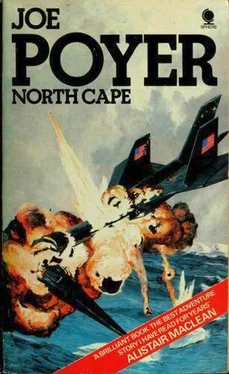Folsom dropped down beside him. “How are you feeling?” When Teleman, too tired to speak, only nodded, he grinned in sympathy. “We’ve covered about thirteen miles so far. I think it’s going to be a little easier from here on in. The map shows this tundra stretching almost to the base. At least we can get rid of these damnable snowshoes.”
Teleman nodded again, barely aware of what Folsom said. His mind was wrapped in a warm haze that not even the bitter cold of the Arctic could penetrate. Folsom’s words meant nothing to him… he was suspended in a sort of limbo through which he floated not caring what happened to him. But when Folsom’s arms went under his to help him to his feet, the haze failed and he was suddenly back in the hell of cold and wilderness. Gadsen cut the thongs that held the snowshoes on, then *collected the four pair and tied them onto his pack. He said nothing and neither did the others. Each man was conserving every last bit of energy he possessed with all the avidity of a miser. Each knew that to expend even the tiniest fraction could mean the difference between reaching the base and freezing to death within sight of it.
The four men struggled on, pushing as far into the tundra as possible before stopping for the night. Teleman continued to move mechanically in the semi-daze that had overtaken him earlier, but the rest had refreshed him somewhat and he was now able to stumble forward by himself. He had long ceased to feel the cold as such, to feel it as anything but an iron pain clamped down upon his entire body. His heart, he was dimly aware, was beating at the same trip-hammer rate that had alarmed him during the final moments of flight. Every movement was sluggish in the extreme, and he no longer thought about the damage being done to his body by the impossible stress being placed on it by the intense cold and the bone-breaking task of hiking twenty-five miles through subzero cold. He longed for the warm hospital bed and the intensive care that normally followed each flight. Instead he moved in a world of his own, in which the glimmering moon and the pale stars beginning to show as the clouds were slowly torn to pieces by the aftermath of the storm were a blur overhead. He had even stopped concentrating on placing one foot in front of the other. His subconscious had now taken over the task of moving his legs in proper rotation. He was only hours from death and he no longer cared.
Larkin paced slowly back and forth before the insulated windows fronting the dimly lit bridge, apparently oblivious to the scene around him. At eight consoles, eight technicians sat hunched before the banks of instruments. The atmosphere was heavy with depression. Nothing had been heard from the shore party for nearly twelve hours. During that time the shadowy Soviet submarine had moved slowly out of the Porsangerfjord and rounded the point to slip carefully down the northern coast of the island at a depth of sixty feet.
The RFK, standing twenty miles offshore, had long since run out of the freakish waterlayer conditions that had expanded her sonar range earlier in the day. In fact, reverse conditions were now in effect. The RFK’s sonar gear had an operational echo-ranging capability of thirty-eight miles under optimum conditions. Now she was able to pick up firm signals only at a maximum of twenty-two miles. Beyond that the decreasing signalto-noise ratio wiped away any traces of the target. In spite of the trouble with the sonar gear, they had been able to follow as the submarine had moved twice from the southeastern end of the island in Porsangerfjord to its mouth on the western side, and then out into the Barents Sea to proceed slowly down the coast as if searching out a landing site. They passed the point of beach where the American party had landed, and continued down the coast. At first Larkin had thought, as the submarine had come to a stop to lay off the coast with only the sail showing, that they were examining the terrain. Now he was not so sure. The sub had remained surfaced for twenty minutes, long enough to have launched a raft. If indeed a second party had gone ashore they would logically have landed several hours travel up the coast from where Folsom and his men were. Larkin had no firm idea of just how fast and far they had traveled, but his last radio contact with Folsom, several hours after they started out, had put him a mile west of where the sub came to a stop. By the time the submarine had arrived off the coast in the late afternoon, Folsom would certainly have moved several miles farther west. Evidently the Soviet commander had misjudged the Americans’ rate of progress.
His face betraying none of the anxiety he felt, Larkin continued his pacing back and forth across the bridge, stopping now’ and then to examine a scope over a technician’s shoulder. If ever there had been a hand-picked crew aboard any United States Navy ship, the small complement of eighty men aboard the highly automated RFK were it. Every man had been personally requested by Larkin, many from personal knowledge of their capabilities and the rest from service records. They were the best there was, he knew. And he had drilled them mercilessly into an operational team in which every man knew exactly what was expected of him — the basis of proper and workable military discipline. It was not, however, the crew’s reaction to the tense situation facing them — or their future performance — that he was worried about. Each and every crew member was aware that the Russian submarine they were stalking could easily be carrying nuclear missiles. And at a few miles, even if their missile defenses were quick enough to destroy incoming weaponry, any nuclear explosion could be fatal to the ship’s crew. No, Larkin was not worried about the crew. They knew what they faced, and had known since the day they agreed to sign on — that this possibility was more likely to come to pass on the RFK than on any other operational ship of the Navy. For a moment the grim humor of the situation relaxed Larkin’s mind. The ship, the most advanced in any navy in the world, the one always earmarked for just such clandestine operations as played tag with nuclear destruction, had been named for a man whose overriding concern was the nuclear disarmament of the world. Larkin shook his head and turned to face the line of windows.
The cold seas were running savagely; there was no relief for his introspective mood from that quarter. Larkin swung himself into the high seat before his own console. The meteorological officer two consoles away tore off a Xerox and reached over to hand it to him. Larkin took it with some misgivings. But it was only the quarter-hourly weather report indicating moderating seas for the next thirty-six hours. He turned again toward the window.
The seas, this close onto the coast, were no longer breaking over the bow in huge runnels of water, but the waves were still running forty feet or better. The lingering half light of the short midwinter day was still bright enough to show the grayish-green color of the half-frozen surface as it billowed up into sharp-edged mountains only to be struck broadside by violent winds that sheered off the crests, as neatly as would a razor, in long foamy streamers. The seas might be in the process of moderating, but here on the Norwegian north coast, exposed to the full force of the dying gale, actual conditions were showing little support for such optimistic predictions. As he continued to gaze out the ports, his mind turned to the supplementary orders that had come in over the private channel minutes earlier. The gist of the orders was that Larkin was empowered to notify the Norwegian Government and request their assistance if the situation got out of hand too rapidly for long-distance consultation. If that was not forthcoming, then he was instructed to ask for asylum for the pilot and his three crewmen. He was not, and the not was underlined, allowed to do so except in the most extreme emergency.
Читать дальше












